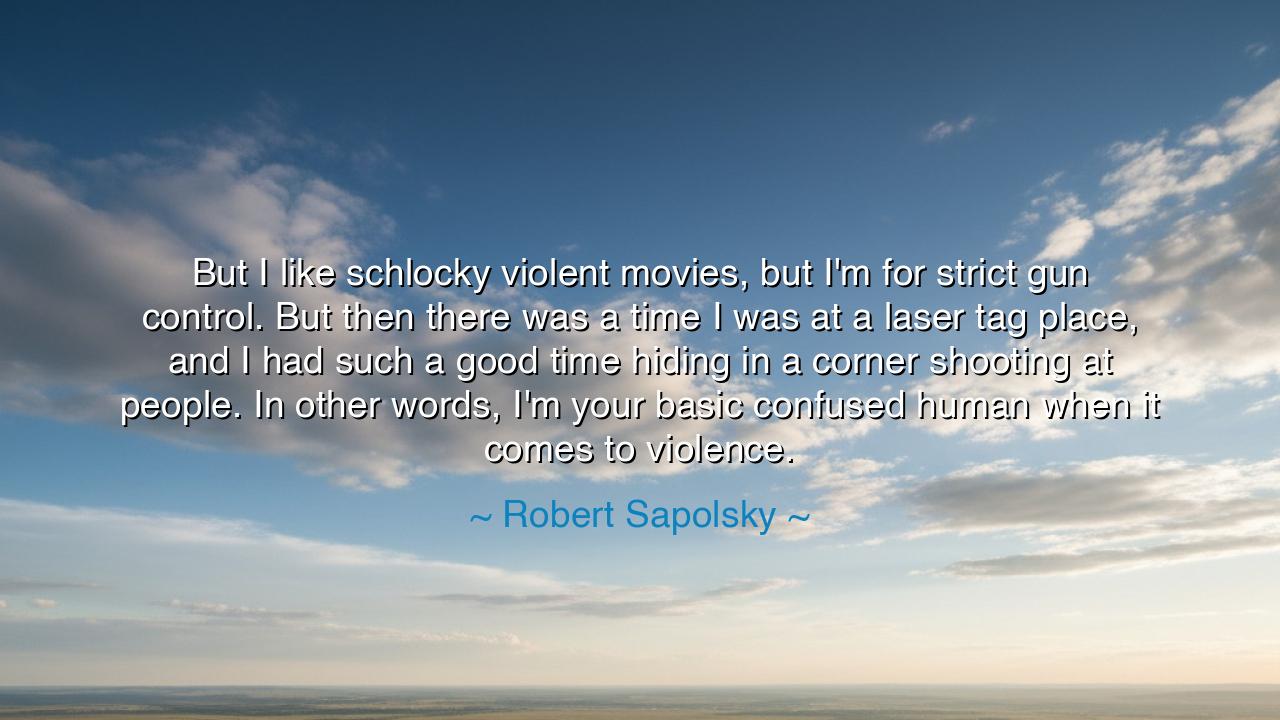
But I like schlocky violent movies, but I'm for strict gun
But I like schlocky violent movies, but I'm for strict gun control. But then there was a time I was at a laser tag place, and I had such a good time hiding in a corner shooting at people. In other words, I'm your basic confused human when it comes to violence.






When Robert Sapolsky confessed, “But I like schlocky violent movies, but I'm for strict gun control. But then there was a time I was at a laser tag place, and I had such a good time hiding in a corner shooting at people. In other words, I'm your basic confused human when it comes to violence,” he gave voice to the contradiction that lives in the breast of every man. For within us is both the yearning for peace and the fascination with conflict, both the cry for safety and the thrill of battle. His words do not reveal weakness, but truth—that the human soul is not simple, but tangled, filled with paradoxes that even the wisest cannot wholly resolve.
The origin of this paradox lies deep in our nature. For thousands of years, mankind has lived by the spear and the sword. To fight was often to survive. To be drawn to violence, to thrill at the hunt or the clash, was once not a contradiction but a necessity. Yet as civilizations grew, as laws rose, as communities sought peace, that old fire was not extinguished—it was merely hidden beneath layers of restraint. Thus, in Sapolsky’s words, we see the eternal struggle: the instincts of the ancient hunter still stir in us, even as our reason calls for peace and justice.
Consider the story of Theodore Roosevelt, a man who loved books and philosophy, who spoke often of civilization and progress. Yet he was also drawn to the wilderness, to the hunt, to the thrill of testing himself against danger. He could write essays on peace and still ride joyfully into battle. Was he a hypocrite? No—he was human, carrying within him the same contradictions Sapolsky admits. Just as Roosevelt reconciled the pen with the rifle, so too do we wrestle with both impulses: the desire to create, and the temptation to destroy.
The meaning of Sapolsky’s words is not merely to confess confusion, but to remind us that clarity does not always come from denying contradictions, but from naming them. To say, “I am conflicted” is an act of honesty, for who among us is not? We may preach compassion yet find ourselves drawn to tales of warriors. We may speak of peace and yet feel the thrill of the chase, even in harmless play. The lesson is not that we are broken, but that we are complex. And in this complexity lies our humanity.
Yet the danger is real. To indulge violence without thought is to fall into savagery. To deny its existence altogether is to deceive ourselves. The path of wisdom lies in discipline—to channel our ancient impulses into forms that do not destroy, but refine. Just as the martial arts teach not only how to strike but also how to restrain, so too must we learn to balance our instincts. Enjoy the story of battle on the screen, but labor in life for peace. Play at games of combat, but uphold in society the sacred laws that preserve life.
The lesson is this: do not fear the contradictions within you. Instead, bring them into the light. Recognize the instincts of violence, but master them with reason, compassion, and restraint. To be human is not to be pure of conflict, but to wrestle with it, to guide it, to choose again and again the higher path. The man who denies his inner fire may one day be consumed by it; the man who understands it may yet turn it into warmth for others.
What, then, should you do? First, acknowledge your inner paradoxes without shame. Second, seek outlets that give form to your instincts without bringing harm—whether in art, sport, or storytelling. Third, uphold in society the values of peace, justice, and strict control over the tools of destruction, so that our shared world is safer even as our private struggles continue.
Thus, Sapolsky’s words remind us of the eternal truth: to be human is to live with contradictions. We are both the hunter and the healer, both the warrior and the sage. But the greatness of man lies not in erasing this conflict, but in mastering it—choosing, even when we feel the thrill of violence, to stand for compassion, for restraint, and for peace.






AAdministratorAdministrator
Welcome, honored guests. Please leave a comment, we will respond soon